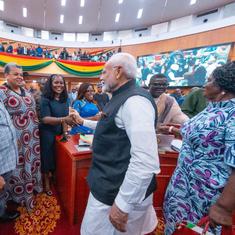“It’s time for us to work together to give the Global South its rightful seat at the table,” Prime Minister Narendra Modi told the Trinidad and Tobago Parliament earlier this month. This rallying cry, echoed by External Affairs Minister S Jaishankar’s assertion that India had “walked the talk” on amplifying the voice of the Global South during its G20 presidency in 2023, suggests a deep commitment to justice, equity, and solidarity among formerly colonised nations.
Yet, beyond the stage-managed speeches and summit diplomacy lies a starkly contradictory reality.
India’s foreign policy under the Modi regime has demonstrated a troubling dissonance between word and deed, particularly when it comes to supporting contemporary anti-colonial, anti-imperial struggles – the very foundation upon which Global South solidarity has been built historically.
While India continues to posture as a champion of decolonial justice, its abstentions, evasions and silences on key issues indicate a growing complicity with forces driven by the impulses New Delhi claims to be standing against.
Shared history
The Global South is united not simply by geography but a shared history of political and economic subjugation, a history shaped by centuries of colonisation and extractive global capitalism.
The fight of formerly colonised nations to assert their sovereignty and self-determination is not merely a legacy struggle – it is ongoing. The Palestinian resistance, the Iranian challenge to Western hegemony and the Tibetan struggle for cultural and political autonomy are contemporary examples of this unfinished decolonial project.
India’s recent positions on these issues, however, reveal a pattern of selective advocacy, where solidarity is expressed only when it does not offend powerful global interests.
Take Palestine. For decades, India was among the most steadfast supporters of Palestinian statehood, reflecting its own anti-colonial roots. But under the Narendra Modi government, this solidarity has been eroded. India has cultivated an increasingly close strategic relationship with Israel, evident not just in defence and intelligence cooperation, but in diplomatic alignments as well.
Despite widespread international condemnation of Israel’s military actions in Gaza, including from traditional Western allies such as France, Germany, and the United Kingdom, India chose to abstain from the latest United Nations General Assembly resolution on June 12 calling for an immediate ceasefire.
A nation that once prided itself on principled non-alignment has, in this case, aligned itself with occupation and impunity.
Civilisational ties
The case of Iran presents a different but related form of hypocrisy. India and Iran share strong civilisational ties and the two nations have often found common ground in opposing Western domination. Yet, India’s response to the recent illegal Israeli and American strikes on Iranian nuclear scientists and facilities has been disappointingly muted.
When the Shanghai Cooperation Organisation issued a statement condemning these attacks, India conspicuously distanced itself. In doing so, it failed not only a long-time partner, but also the broader principle of sovereignty in the face of imperial aggression.
Iran’s anti-imperial history – from the 1953 Central Intelligence Agency-backed coup to the 1979 revolution – may be ideologically inconvenient for Western powers, but it is central to any serious conversation about Global South resistance. India’s silence here is not neutrality. It is acquiescence.
Then there is Tibet, a far more uncomfortable test for India’s claims, given the oppressor is China, a fellow member of the Global South. India has long hosted the Tibetan exile community and the Central Tibetan Administration in Dharamshala, but it has increasingly adopted a policy of studied disengagement.
Most recently, the Ministry of External Affairs declared it “does not take any position” on the Dalai Lama’s succession, on the grounds that the matter is a purely religious one. But the stakes of the Dalai Lama’s succession are political not merely spiritual. Beijing’s attempt to impose its own candidate for the next Dalai Lama is part of a broader strategy of cultural colonisation and political control over Tibet.
For India to pretend otherwise is to abandon a people whose resistance it once quietly supported. Again, this is not impartiality. It is strategic cowardice.
A clear pattern
What emerges is a clear pattern: when support for oppressed peoples comes at no geopolitical or economic cost, India is willing to speak. But when taking a stand would require confronting global or regional powers – be it China, the United States, or Israel – the Modi government prefers silence dressed up as non-alignment.
This is not the behaviour of a principled leader of the Global South. It is the behaviour of a state guided more by realpolitik and economic self-interest than by any genuine commitment to decolonial solidarity.
To be a true voice of the Global South is not merely to invoke its name at summits or in speeches before foreign parliaments. It is to stand up for the people who suffer under the same structures of power that once subjugated India itself.
It is to challenge, not appease, the powers that perpetuate occupation, intervention, and cultural erasure. It is to walk the talk – even when the path is uncomfortable.
However, India’s current foreign policy attempts to have its cake and eat it too. It wants the prestige of leading the Global South without paying the political costs of standing with its oppressed. It wants to appear as a moral power while remaining diplomatically cosy with economic and military hegemons.
But in the crucible of global justice, such duplicity does not go unnoticed. Solidarity, after all, is not a slogan – it is a choice. India, tragically, is choosing silence.
Vishal R Choradiya is an assistant professor with the Department of Professional Studies, Christ University, Bengaluru.










